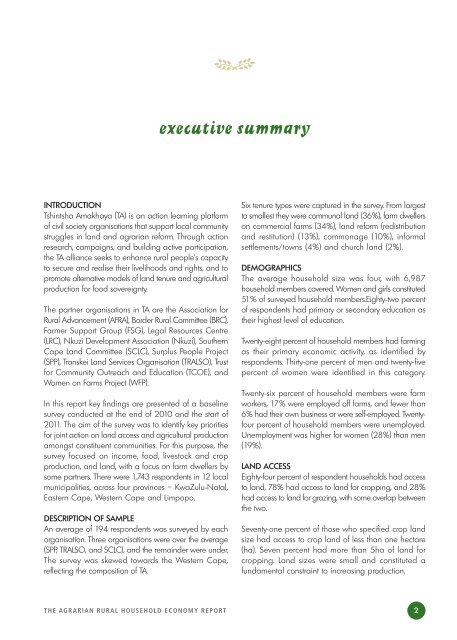THE AGRARIAN RURAL HOUSEHOLD ECONOMY
THE AGRARIAN RURAL HOUSEHOLD ECONOMY
THE AGRARIAN RURAL HOUSEHOLD ECONOMY
Create successful ePaper yourself
Turn your PDF publications into a flip-book with our unique Google optimized e-Paper software.
INTRODUCTION<br />
Tshintsha Amakhaya (TA) is an action learning platform<br />
of civil society organisations that support local community<br />
struggles in land and agrarian reform. Through action<br />
research, campaigns, and building active participation,<br />
the TA alliance seeks to enhance rural people’s capacity<br />
to secure and realise their livelihoods and rights, and to<br />
promote alternative models of land tenure and agricultural<br />
production for food sovereignty.<br />
The partner organisations in TA are the Association for<br />
Rural Advancement (AFRA), Border Rural Committee (BRC),<br />
Farmer Support Group (FSG), Legal Resources Centre<br />
(LRC), Nkuzi Development Association (Nkuzi), Southern<br />
Cape Land Committee (SCLC), Surplus People Project<br />
(SPP), Transkei Land Services Organisation (TRALSO), Trust<br />
for Community Outreach and Education (TCOE), and<br />
Women on Farms Project (WFP).<br />
In this report key findings are presented of a baseline<br />
survey conducted at the end of 2010 and the start of<br />
2011. The aim of the survey was to identify key priorities<br />
for joint action on land access and agricultural production<br />
amongst constituent communities. For this purpose, the<br />
survey focused on income, food, livestock and crop<br />
production, and land, with a focus on farm dwellers by<br />
some partners. There were 1,743 respondents in 12 local<br />
municipalities, across four provinces – KwaZulu-Natal,<br />
Eastern Cape, Western Cape and Limpopo. .<br />
DESCRIPTION OF SAMPLE<br />
An average of 194 respondents was surveyed by each<br />
organisation. Three organisations were over the average<br />
(SPP, TRALSO, and SCLC), and the remainder were under.<br />
The survey was skewed towards the Western Cape,<br />
reflecting the composition of TA.<br />
<strong>THE</strong> <strong>AGRARIAN</strong> <strong>RURAL</strong> <strong>HOUSEHOLD</strong> <strong>ECONOMY</strong> REPORT<br />
executive summary<br />
Six tenure types were captured in the survey. From largest<br />
to smallest they were communal land (36%), farm dwellers<br />
on commercial farms (34%), land reform (redistribution<br />
and restitution) (13%), commonage (10%), informal<br />
settlements/towns (4%) and church land (2%). .<br />
DEMOGRAPHICS<br />
The average household size was four, with 6,987<br />
household members covered. Women and girls constituted<br />
51% of surveyed household members.Eighty-two percent<br />
of respondents had primary or secondary education as<br />
their highest level of education.<br />
Twenty-eight percent of household members had farming<br />
as their primary economic activity, as identified by<br />
respondents. Thirty-one percent of men and twenty-five<br />
percent of women were identified in this category.<br />
Twenty-six percent of household members were farm<br />
workers, 17% were employed off farms, and fewer than<br />
6% had their own business or were self-employed. Twentyfour<br />
percent of household members were unemployed.<br />
Unemployment was higher for women (28%) than men<br />
(19%).<br />
LAND ACCESS<br />
Eighty-four percent of respondent households had access<br />
to land, 78% had access to land for cropping, and 28%<br />
had access to land for grazing, with some overlap between<br />
the two.<br />
Seventy-one percent of those who specified crop land<br />
size had access to crop land of less than one hectare<br />
(ha). Seven percent had more than 5ha of land for<br />
cropping. Land sizes were small and constituted a<br />
fundamental constraint to increasing production. .<br />
2


